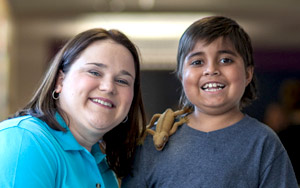
Popular Locations
- Pediatric Specialty Center - Park Avenue Medical Center
- Yale New Haven Children's Hospital
- Yale New Haven Hospital - York Street Campus

To a young child, the hospital can be a mysterious, sometimes fearful place—especially if he or she is going there for medical tests, treatments or procedures. Does getting an IV mean the nurse is going to stick something in my eye? Does a CAT scan have something to do with my kitty?

Answering these and many other questions in plain, child-friendly, age-appropriate language is one of the many important jobs of Certified Child Life Specialists at Yale New Haven Children’s Hospital. Specifically educated in the field and certified by the national Child Life Council, these members of YNHCH’s multidisciplinary medical/surgical support services help children—from infants to teens—cope with being in the hospital by providing them with a variety of play, preparation and therapeutic, educational and distraction activities.
Kendra Frederick, a Certified Child Life Specialist assigned to pediatric hematology/oncology, works with children diagnosed with cancer, leukemia, sickle cell anemia or other blood disorders. She has decorated patient hospital rooms to make them more home-like and created personalized books with pictures from around the hospital to teach or prepare a child and his family for certain procedures.
“As child development specialists, we are educators within the hospital,” Frederick says of YNHCH’s 17 Certified Child Life Specialists who are assigned to various inpatient and outpatient departments at YNHCH, as well as to the pediatric floor at Bridgeport Hospital and Yale New Haven clinics within the community. “We take all that complicated information that children, parents and siblings receive from nurses and doctors and break it down in ways they can better understand.” Frederick also routinely interacts with the medical staff, as well as specialists in child psychology and social work. “I visit my patients with the attending physicians each morning and have daily contact with the nursing staff,” she says. “Once a week, Child Life Specialists have a psychosocial meeting—with attending physicians, nurses, child psychologists, neuropsychologists, social workers and others—to talk about each patient and how we can work together to support them.”
Frederick is often right there with her patients during an examination or procedure to quell any fears by using preparation, medical play and distraction techniques, such as blowing bubbles, playing with a favorite toy or interacting on an iPad.
“Child Life staff advocates to be present during procedures that are painful or anxiety- producing,” she notes, “and we also help children become more comfortable with what’s going on.”
Since joining YNHCH in 2008, Frederick has been heartened to see the Child Life program grow “by leaps and bounds and into more areas of the hospital,” she says in distinguishing this essential service at Yale New Haven Children’s Hospital. “Plus, we are always thinking about ways we can provide our services outside in the community. For instance, we have specialists reaching out to primary care physicians to educate them about Child Life.” No wonder Frederick compares her role to that of an educator.